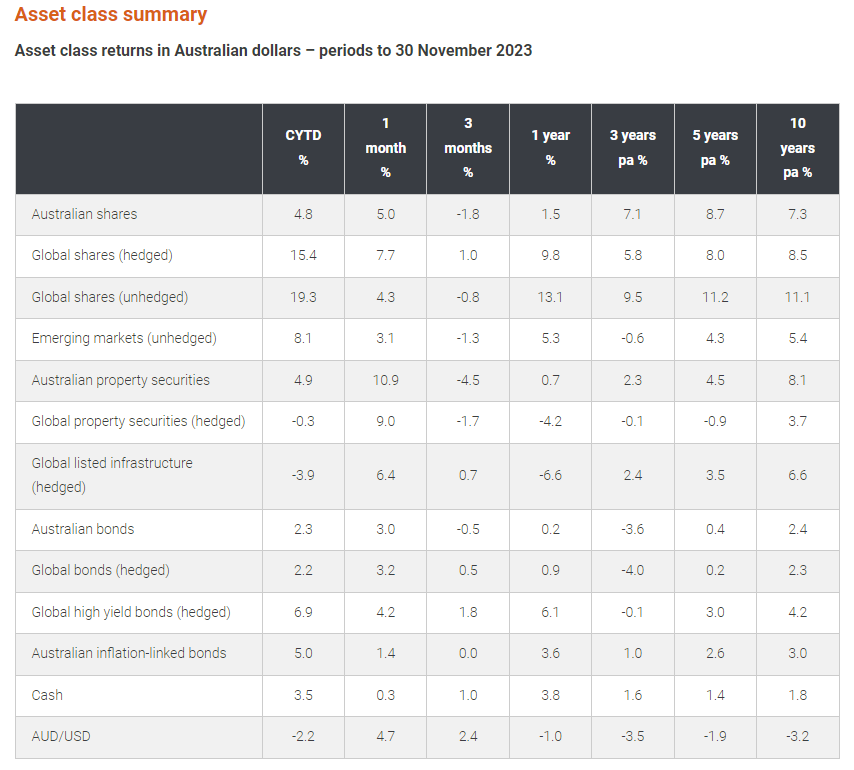Key events in November
- Global share prices made a very strong recovery in November after the sharp falls of September and October. Milder global inflation results and lower global government bond yields were the key positives for global shares.
- US consumer annual inflation came in at 3.2% in October given lower gasoline prices. Employment gains also moderated, thereby suggesting that the US economy was gradually cooling after a strong run. Chinese share markets delivered only mild gains in November given subdued signs on China’s economic activity.
- Australian shares made strong gains following the lead of global shares. The Health Care (11.7%) and Real Estate Investment Trust (10.9%) sectors made strong comebacks with hopes that bond yields and interest rates have peaked. Information Technology (7.3%) also made robust gains on the back of Wall Street’s optimism. There were some disappointing sector performances. Energy (-7.4%) given the falls in global energy prices, and Utilities (-6.0%) as investors became less defensive in November.
- Australia’s economy is providing mixed signals with inflation moderating but retail spending struggling. Consumer annual inflation fell from 5.6% in September to 4.9% in October largely on the back of lower fuel prices and holiday travel costs. A cautious consumer is also tempering inflation. Retail spending fell in October with consumers feeling the strain of higher interest rates. There were some positive surprises with strong job gains in October. The Reserve Bank of Australia (RBA) raised the cash interest rates again by 0.25% to 4.35% in November given concerns that inflation would stay “higher for longer” and well above their 2% to 3% target range.

Past performance is not a reliable indicator of future performance.
Sources: Australian shares – S&P/ASX 200 Total Return Index; Global shares (hedged) – MSCI All Countries World (A$ hedged, Net); Global shares (unhedged) – MSCI All Countries World in A$ (Net); Emerging markets – MSCI Emerging Markets in A$ (Net); Australian property securities – S&P/ASX 300 A-REIT Accumulation Index; Global property securities – FTSE EPRA/NAREIT Developed (A$ hedged, Net); Global listed infrastructure – FTSE Global Core Infrastructure 50/50 (Hedged $A); Australian bonds – Bloomberg AusBond Composite 0+ Yr Index; Global bonds (A$ hedged) – Barclays Global Aggregate (A$ hedged, Gross); Global high yield bonds (A$ hedged) – Barclays US High Yield Ba/B Cash Pay x Financials ($A Hedged); Australian inflation-linked bonds – Bloomberg AusBond Inflation Government 0+ Yr Index; Cash – Bloomberg AusBond Bank Bill Index; AUD/USD – WM/Reuters Daily (4 pm GMT).
Key events in global markets over the last three months to November
Persistent inflation, rising bond yields and interest rates as well as the Hamas-Israel conflict has seen share prices struggle over recent months. There were sharp share price declines recorded in September and October given this challenging economic and political climate. However, in November there was a strong share price rebound given hopes that milder inflation would allow central banks to keep interest rates steady. Global shares (hedged) recorded a mildly positively 1% return for the past three months. The recent revival in the Australian dollar has seen global shares (unhedged) deliver a weak -0.8% return for the past three months.
Wall Street’s benchmark S&P 500 Index delivered a solid 1.6% return, in local currency terms, for the past three months. Yet this has been a volatile performance given swings in sentiment on inflation and interest rate prospects for the US. While US consumer annual inflation moderated to 3.2% in October, the guidance from the US central bank is that inflation is still too high and that further interest rates may be needed.
European shares also delivered mild gains in local currency terms. Continued tough talk on interest rates by central banks and the tragic Russia-Ukraine conflict have been a constraint for European shares.
Asian share markets also struggled. The MSCI China Index delivered a disappointing -5.1% quarterly return in local currency terms. Concerns over China’s economic activity and the financial stress in the property sector remain formidable headwinds to investors. By contrast, Japan’s Nikkei 225 Index delivered a strong 3.4% quarterly return with the central bank’s assurance that interest rates would remain low despite accelerating inflation.
Global bonds (hedged) delivered a mild 0.5% quarterly return with signs of a slowing global economy being counterbalanced by inflation concerns.
Global high yield bonds (hedged) made a solid 1.8% gain for the quarter as investors found the elevated yield level of corporate bonds more attractive.
Key events in Australia over the last three months to November
Australian shares delivered a disappointing quarterly turn of -1.8%. There were sharp negative returns for the Energy (-10.7%) sector as slower global economic activity undermined coal and oil prices. Information Technology (-8.6%) also fell sharply as investors curbed their enthusiasm for the promise of ‘Artificial Intelligence’ (AI). The Consumer Staples sector also delivered a very weak -6.4% return as the health of the consumer came into the spotlight.
Australia’s economy shows significant slowdown signs with weak retail spending and falling housing construction. The impact of higher goods and services prices, rising mortgage interest rates and rent has generated a ‘painful squeeze’ for Australian consumers. However there has been positive surprises. Employment has recorded solid gains and the unemployment rate remains low at 3.7%. The RBA raised the cash interest rate by 0.25% to 4.35% in November citing that inflation was “still too high and is proving more persistent than expected”.
Global prospects
Global share prices have positively surprised this year by making very strong gains. The mania for AI and anything with a technology flavour had been the key driver. However, the past quarter has been volatile as tougher rhetoric from central banks suggested that interest rates could be held “higher for longer” to reduce inflation. The continued tragic Russian-Ukraine War and October’s Gaza-Israel conflict are also considerable challenges to the global economic stability and investor sentiment.
Accordingly, there are significant inflation, interest rate and political risks that investors should be cautious of. For investors, assessing these complex risks is particularly challenging. As there are multiple positive and negative outcomes possible over the next year, investors should maintain a disciplined and diversified strategy.
Important information
This communication is provided by MLC Investments Limited (ABN 30 002 641 661, AFSL 230705) (MLCI) and IOOF Investment Service Limited (ABN 80 007 350 405, AFSL 230703) (IISL). Both MLC and IISL are part of the Insignia Financial Group of companies (comprising Insignia Financial Ltd, ABN 49 100 103 722 and its related bodies corporate) (‘Insignia Financial Group’). An investment with MLCI or IISL does not represent a deposit or liability of, and is not guaranteed by, the Insignia Financial Group.
This information may constitute general advice. It has been prepared without taking account of an investor’s objectives, financial situation or needs and because of that an investor should, before acting on the advice, consider the appropriateness of the advice having regard to their personal objectives, financial situation and needs. Past performance is not a reliable indicator of future performance. Share market returns are all in local currency. Any opinions expressed in this communication constitute our judgement at the time of issue and are subject to change. We believe that the information contained in this communication is correct and that any estimates, opinions, conclusions or recommendations are reasonably held or made as at the time of compilation. However, no warranty is made as to their accuracy or reliability (which may change without notice), or other information contained in this communication.
This information is directed to and prepared for Australian residents only.
MLCI or IISL may use the services of any member of the Insignia Financial Group where it makes good business sense to do so and will benefit customers. Amounts paid for these services are always negotiated on an arm’s length basis. MLCI and IISL rely on third parties to provide certain information and is not responsible for its accuracy, nor is MLCI nor IISL liable for any loss arising from a person relying on information provided by third parties. Bloomberg Finance L.P. and its affiliates (collectively, “Bloomberg”) do not approve or endorse any information included in this material and disclaim all liability for any loss or damage of any kind arising out of the use of all or any part of this material.
The funds referred to herein is not sponsored, endorsed, or promoted by MSCI or IISL, and neither MSCI or IISL bear liability with respect to any such funds.







